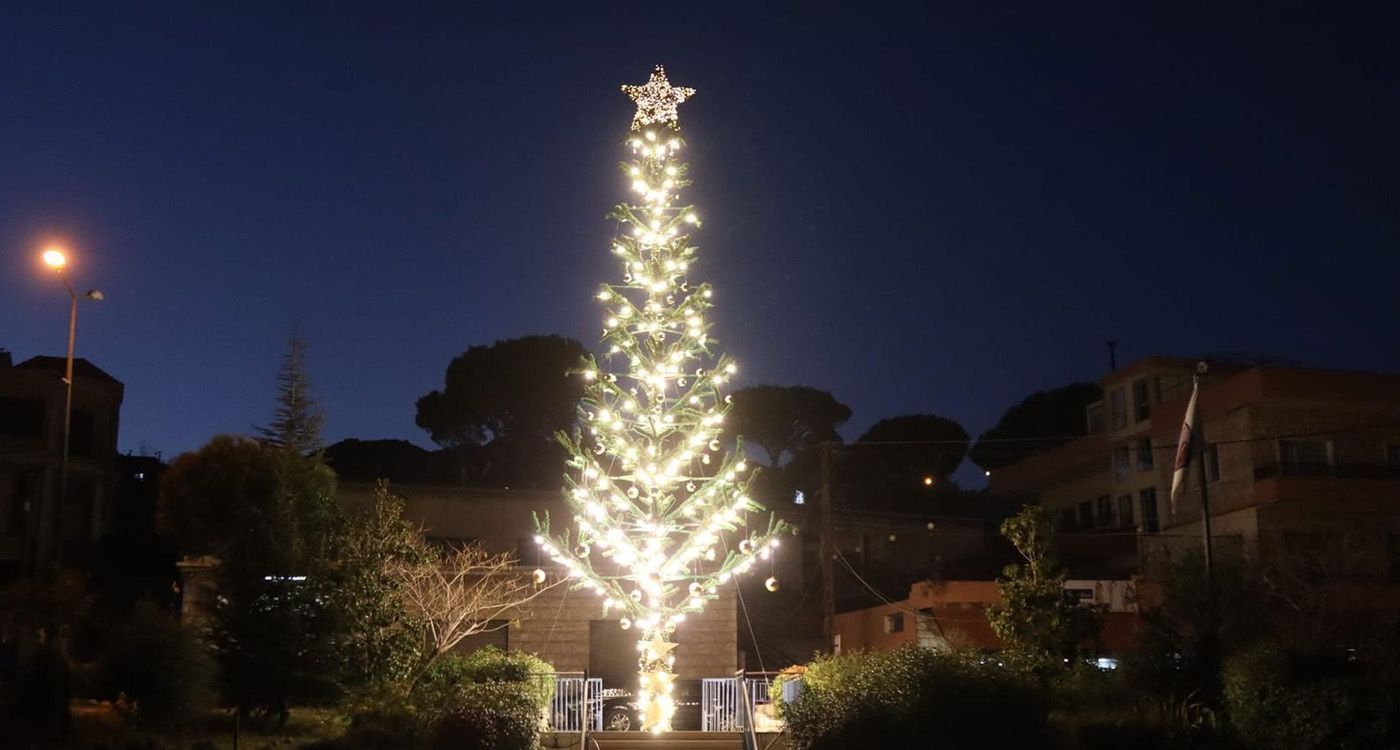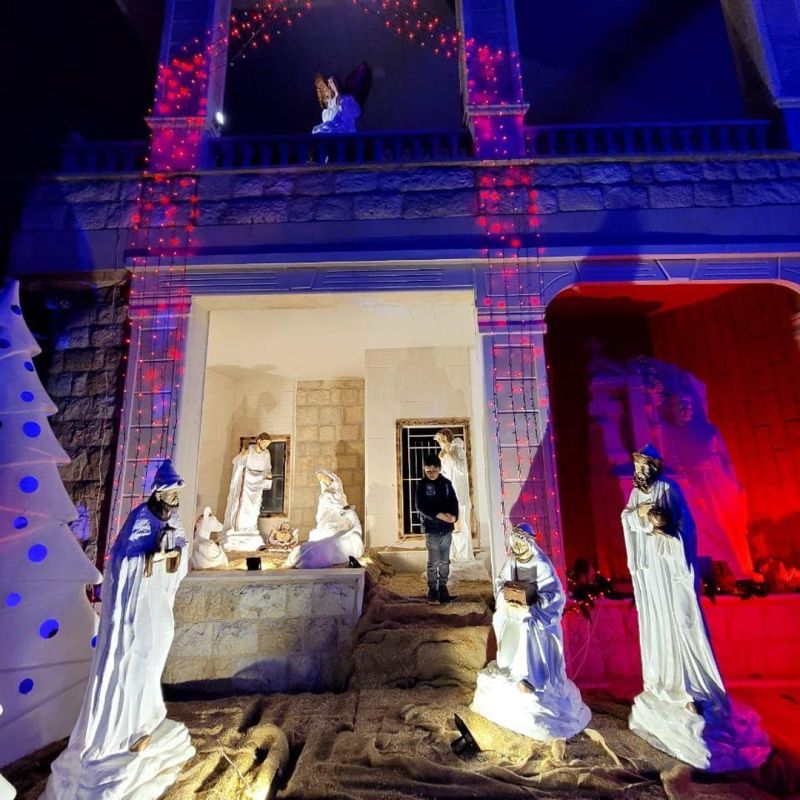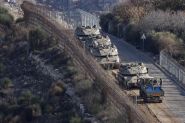
We’ve all lost something, but we’ve also learned to help one another. It’s important to keep the Christmas spirit alive, even if it’s challenging under the current circumstances. We need to show that we’re rooted here, that we haven’t given up hope,” says Paul, a shop owner in Marjeyoun, as he carefully arranges his displays, just as he always does. It’s almost as if, only weeks ago, he hadn’t been gripped by the fear that the war would drag on, denying him the chance to return to a normal life.
After a year and three months of war and devastation, Christmas in the Marjeyoun district carries a different tone—one steeped in melancholy. The mood is somber, despite earnest efforts to create a festive atmosphere. Christmas trees, which annually light up the squares of Christian villages, have been put up once again, along with nativity scenes.
In Klayaa and Rmeish, people are trying to move past the months of fear. The squares of both villages, now hosting Christmas recitals, sparkle with a thousand lights.
The destruction and the loss of loved ones have left deep scars. The region is still healing, struggling to regain a semblance of normalcy against all odds. This year, Christmas has taken on new meaning—a symbol of hope, resilience, and renewal. Despite everything, optimism prevails.
The Nativity is celebrated amidst ruined buildings, wrecked roads, and ravaged villages —a stark reminder of the horrors endured during the war.
The streets of Marjeyoun, usually lively ahead of the holidays, are more subdued this year. Decorations are simple yet meaningful, as if the town is struggling to embrace the festive spirit. Christmas trees stand proudly, and the churches echo with carols—but only until 5 PM, as a curfew imposed by the Israeli army remains in effect from 5 PM to 7 AM.
Storefronts, adorned with a few garlands and modest Christmas trees, reflect resilience in the face of adversity. The main Christmas tree, though decorated, remains understated and seems almost overwhelmed by the scale of the challenges the region continues to face.
Local associations are still rallying dozens of volunteers to wrap gifts that will bring a sparkle to the eyes of children who have endured the traumas of war.
#Christmas in South Lebanon: A Breath of Life, a Hint of Melancholy pic.twitter.com/sZqP9MtAY6
— This is Beirut (@ThisIsBeirut_) December 24, 2024
A Welcome Respite
This return to local traditions provides a much-needed break for the people of the South, allowing them to refocus on the values of peace, love, and community. "Even though we live in a difficult region, given its proximity to the Israeli border, we want to show that the South is not defined by war. Here, many religions coexist, and this tree symbolizes our ability to come together and celebrate the key moments of this sacred holiday," says Sari Gholmieh, vice president of the Marjeyoun municipality.
Christmas markets and festive activities are absent this year. The souks, once bustling with life and color, now stand nearly empty. The store window decorations barely cover up the lack of customers. Sales are down, and shopkeepers, grappling with economic hardship, openly express their frustration at a season that was meant to be filled with joy and prosperity. "We hope people will come to celebrate the holidays with us and support our small businesses," says Shadi, a shop owner.
Shops are open and well-stocked, but almost everything is on sale after a long period of closure. Restaurants are seldom busy. Christmas reflects a Lebanon drained and still mired in its crises. "All signs of joy seem fake this year. But it's still a way to prove that we exist and show that despite all the crises, we are still alive. Perhaps the prayers on Christmas Eve will be, for us, the best way to express our need for the Savior to guide humanity," says Ramzi, a restaurant owner.
The residents of the border region are accustomed to “difficult times,” says Father Antonios Farah at St. George’s Church in Klayaa, where a life-sized Nativity scene stands proudly. “We decided to resist and remain here. We must fully embrace the joy of Christmas. It is our way of praying for peace,” he adds. Despite the persistent fear and anxiety felt by the people of Rmeish and surrounding villages, they are doing their best to embrace the holiday spirit. The streets of Rmeish, usually bustling with activity at this time of year, now stand nearly deserted by nightfall. Victoria, a village resident, is determined to uphold her traditions: “Attending midnight mass, spending Christmas Eve with family, welcoming Santa... we must live the joy of Christmas,” she says.

Hope Remains Amid Ruins and Suffering
In the traditional homes of Marjeyoun, families are getting ready for Christmas. Children gather to decorate the family tree. “We’ll hang silver garlands and purple lights on the balconies, along the stairs, and on the windows while listening to Christmas carols to fully take in the holiday atmosphere,” says Suzy, who hopes that “this year, the Nativity will symbolize the rebirth of peace in our country.”
Christmas reunions are an invaluable time of joy. Children and young adults who left the village for school or work have returned. The preparations are in full swing, with homes filled with laughter and shared memories. Eager to see their children again, parents spare no effort in decorating the trees and preparing traditional meals, all while reminiscing about past Christmases. “It’s been two years since we’ve celebrated Christmas together,” says Nadine, a mother from Klayaa. “I can’t wait to see my children, hold them close, and share this special moment with them.”
While the joy of reunions prevails, it is also tinged with melancholy. Families gather not only to celebrate, but also to honor the memory of loved ones who lost their lives during the conflict. Candles are lit in their memory, and prayers are said. The pain of absence is ever-present, with laughter often mingling with tears as people remember those they have lost. “I lost my father the day before the ceasefire. Everyone knew him and called him Ammo Abu Fadi. It’s a bittersweet moment today. I remember his laughter, but a deep emptiness remains,” shares Kate, his daughter. “My friends and family have been here for me. Their support has helped me through this difficult time,” she adds.
Reunions take on a deeper meaning as residents, having faced challenging times, show that love and solidarity can overcome adversity.



Comments